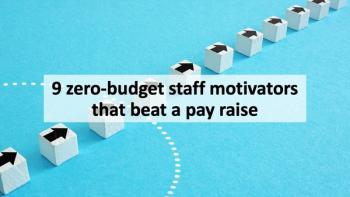
Onboarding New Physicians to your Practice's EHR
Experts say the best way to train a new physician is focusing on patient flow. Do not put them in a classroom.
When physicians don't have the right training on the EHR, they can spend hours a day "bogged down," which means they're not able to use the technology effectively to provide the great care your practice wants to provide, experts say.
"Medical school and residency give young physicians a great clinical background, but if your practice doesn't give these physicians the tools they need to care for patients, they're not going to be able to provide the great care they want to provide," says Jessica Chen, MD, chief quality officer at ChenMed, a Miami Gardens, Fl.-based primary-care provider.
EHR training for new physicians is integrated into the two-week training at ChenMed. The practice guides physicians by walking them through the patient experience from the time of intake until the patient is discharged. This is instead of putting physicians in a classroom setting where they're in front of computers navigating through the EHR. Instead, Chen says new physicians shadow more experienced physicians to learn how to focus on patients, while documenting their care effectively in the EHR.
Also important is training new physicians to view a patient's record in the EHR before the physician walks into the exam room, adds Chen. That means the physician should be aware of any lab results and fully understand any relevant conditions a patient is managing. Prepared with this information before the physician engages with the patient, the physician can then prioritize what needs to be accomplished during that visit and determine whether additional follow up is appropriate.
"Knowing the anatomy of the EHR" is important, she insists. That's because every practice is different and new physicians need to know how to enter orders for labs and medications, for example, at your practice.
Another factor about which practices need to be mindful is the nation's move toward value-based care, adds Chen, whose entire practice is run in the value-based care world. Most of the new reimbursement models include quality parameters that must be achieved, but new physicians - whether they're just out of residency or new to your practice - don't have this training. This is important because physicians need to pay attention to these quality metrics as they make updates to patients’ records in the EHR.
David Wasserman, advisor, practice solutions and medical economics at the Massachusetts Medical Society, recommends that physicians be as specific as possible in their documentation to ensure the practice is able to achieve high levels of quality – and that’s the case whether physicians are new to the practice or in need of a refresher on the EHR. Some practices partner physicians with medical scribes who will document in the EHR, while the physician is caring for the patient and verbalizing what he's doing for the medical scribe.
Another tip for practices when training new physicians on the EHR? A physician's number one priority is being able to maintain personal relationships with their patients, says Wasserman. It's because of strong physician-patient relationships that patients feel comfortable sharing "their concerns and angst" with their physicians. And that, in turn, drives better outcomes for patients because physicians are able to diagnose conditions and direct better patient care.
Newsletter
Optimize your practice with the Physicians Practice newsletter, offering management pearls, leadership tips, and business strategies tailored for practice administrators and physicians of any specialty.








